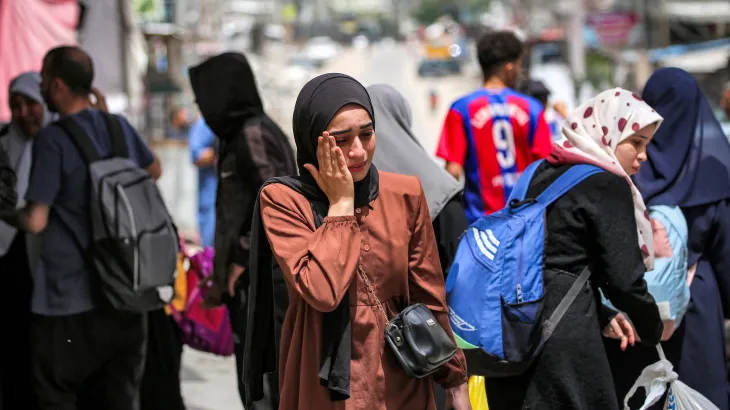Israel Intensifies Military Operations in Southern Gaza
Israel has escalated its military operations in southern Gaza, specifically in the city of Rafah. Tens of thousands of Palestinians have been instructed to leave the area through flyers dropped from the air and social media posts. Residents in the eastern districts have been directed to relocate to al-Mawasi, an area labeled by Israel as an “expanded humanitarian zone.” This exodus has transformed parts of Rafah from bustling streets to deserted ghost towns.
Despite warnings from the US and other allies about the potential for mass civilian casualties and a humanitarian crisis, Israel has affirmed its determination to proceed with planned operations in Rafah. President Joe Biden indicated that a ceasefire could be achieved if Hamas released hostages held since October 7th. Israel reports 128 individuals still missing, with 36 presumed dead.
Recent images show smoke rising over Rafah, with witnesses reporting airstrikes near the crossing with Egypt. The Israel Defense Forces (IDF) have engaged in “face-to-face battles” with Hamas fighters in Rafah and discovered underground shafts in the area. Additionally, Israeli airstrikes targeting what they term “terrorists and terrorist infrastructure” have been carried out across the Gaza Strip.
The IDF confirmed strikes on Hamas targets in the Jabaliya area, located in the far north of the Gaza Strip, and instructed residents in northern Gaza to temporarily evacuate to shelters in western Gaza City. Meanwhile, Hamas rockets targeted Ashkelon, causing minor injuries to three individuals.
The situation remains tense as both sides continue their military actions, raising concerns about the humanitarian impact and the prospects for a ceasefire.
The situation in the Israel-Palestine conflict is indeed deeply rooted in historical grievances, territorial disputes, and competing narratives. Both sides have experienced significant loss and suffering, and there are valid concerns about the treatment of Palestinian populations in areas affected by Israeli military operations and settlements.
The issue of displacement, both historically and in current events like the situation in Rafah, raises serious humanitarian concerns. It’s crucial for all parties involved to prioritize the protection of civilians and adhere to international humanitarian law.
Achieving a lasting solution to the conflict will require addressing the legitimate rights and aspirations of both Israelis and Palestinians. This includes efforts to negotiate a just and equitable resolution to issues such as borders, settlements, the status of Jerusalem, and the rights of refugees.
While perspectives on the conflict vary widely, fostering empathy, understanding, and dialogue between the affected communities is essential for progress towards a peaceful and sustainable resolution.

